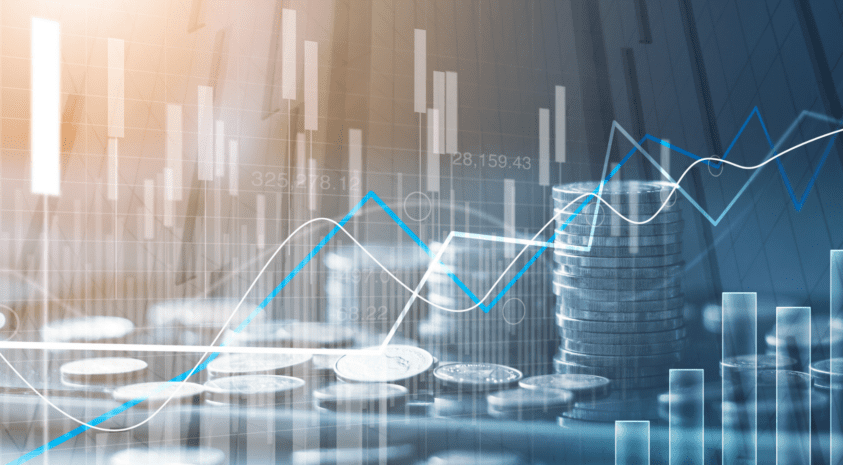Everyone had their eyes on the economy in 2023, navigating federal interest rate hikes, feeling the pinch of inflation and bracing for a recession.
What will happen in 2024? We often look at history to predict how the economy will play out, but according to BlackRock Investment Institute (BII), two “large and unprecedented shocks” should stop us from thinking the economy will act in the “usual way.” Those shocks include the pandemic-induced shift in consumer spending and a worker shortage caused by baby boomers aging into retirement.
Although the future is uncertain, let’s look at three areas of concern for Americans, consider possible outcomes in 2024, and discuss what it all means for you.
1. Inflation:
So far, inflation has generally cooled in 2023, with rates dropping year-over-year from 3.7% in October 2022 to 3.2% in 2023. Some experts believe inflation will continue to decline in 2024 to an average 2%–2.5% range. Blackrock Investment Institute agrees inflation will likely continue to fall, but could ultimately rise again in 2024.
What this means for you: Whether the inflation rate is 3% or 2%, you will still likely feel the pinch of lost purchasing power. You can help combat this by sticking to a budget, finding new ways to increase your income and paying down high-interest debt. Remember to also consider inflation as you plan for retirement and develop a strategy that helps mitigate inflation risk.
2. Recession:
A recession is a significant and widespread economic downturn, such as two consecutive quarters of negative gross domestic product (GDP). Will we or won’t we experience a recession in 2024? Blackrock Investment Institute predicts it’s “still in the cards.” Other experts predict a limited recession risk of 15%.
What this means for you: Recessions often mean layoffs, investments losing money, and lenders implementing stricter requirements. You can help recession-proof your financial plan by building up an emergency savings that could cover three to six months of living expenses. This can help you avoid having to make tough decisions if a recession strikes, such as withdrawing money from your retirement account.
3. Federal interest rates:
The Federal Reserve raises interest rates to help slow the economy and bring down inflation. This makes it more expensive for you to borrow money for large purchases like houses and automobiles.
Since March 2022, the Fed has raised interest rates 11 times, including four times in 2023. Will there be more hikes in 2024, or will we see rate cuts? Several experts seem to agree that the Federal interest rate will decline next year, but not until later in the year—and the decline could be slight compared to the recent rate increases we’ve seen.
What this means for you: If you need a loan that can’t wait, sooner than later might be better in case another rate hike drives up borrowing costs. On the other hand, if you can wait, you might ride it out until later next year and see if you can get a better deal.
Now’s also a good time to pay down any credit card debt you owe. Because credit card interest is usually variable, another rate hike could leave you spending more money on your debt.
Finally, on a brighter note, rate hikes mean better interest rates for savings accounts and CDs. If you have some extra cash at your disposal, consider helping it grow in a money market account or locked up in CD.
2024 economic outlook: final thoughts
There’s no crystal ball that can show us with certainty what will happen in the year to come. But no matter how the economy pans out, you can’t go wrong focusing on saving more; spending less; investing wisely; and protecting your future with products that safeguard your retirement income, health expenses and retirement care. Working with a Bankers Life financial professional can help give you confidence that you’re making smart decisions that support a secure retirement.
Bankers Life Securities, Inc., Bankers Life Advisory Services, Inc., and their representatives do not provide legal or tax advice. Each individual should seek specific advice from their own tax or legal advisors.
This material is for general information only and is not intended to provide specific advice or recommendations for any individual. There is no assurance that the views or strategies discussed are suitable for all investors. To determine which investment(s) may be appropriate for you, please consult your financial professional prior to investing.
Bankers Life is the marketing brand of various affiliated companies of CNO Financial Group including, Bankers Life and Casualty Company, Bankers Life Securities, Inc., and Bankers Life Advisory Services, Inc. Non-affiliated insurance products are offered through Bankers Life Securities General Agency, Inc., (dba BL General Insurance Agency, Inc., AK, AL, CA, NV, PA).
Securities and variable annuities offered through Bankers Life Securities, Inc. Member, FINRA/SIPC (dba BL Securities Inc., AL, GA, IA, IL, MI, NV, PA). Advisory products and services offered by Bankers Life Advisory Services, Inc. SEC Registered Investment Adviser (dba BL Advisory Services, Inc., AL, GA, IA, MT, NV, PA).
Investing involves risks including possible loss of principal. No investment strategy or risk management technique can guarantee return or eliminate risk.
Investments are: Not Guaranteed—Involve Risk—May Lose Value.



